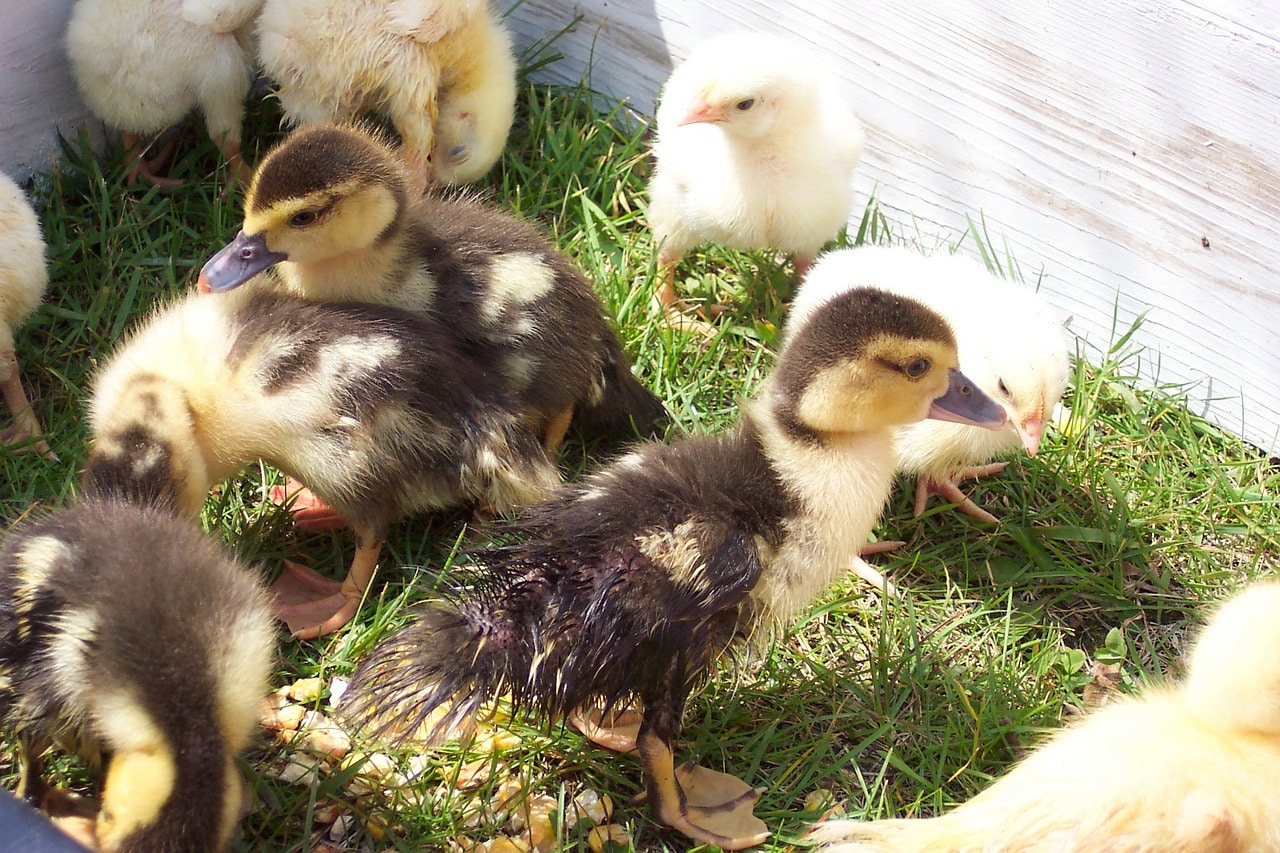If you have a homestead, you probably already have chickens.
Known as the “starter animal” for most small farms or backyards, this animal is one of the most versatile creatures you can keep. It produces tons of eggs, can be raised for meat, and also does an excellent job of keeping all the bugs down.
However, if you’ve been raising chickens for a while – or even if you haven’t and are looking to get your feet wet in the world of raising backyard poultry – you may have asked yourself whether it would be worth your time to raise ducks, too.
If you’re having trouble deciding whether chickens or ducks would be best for your homestead, ponder no more.
Here are all the factors that go into raising both types of birds to help you figure out which species might be best for your small homestead.
Egg Production
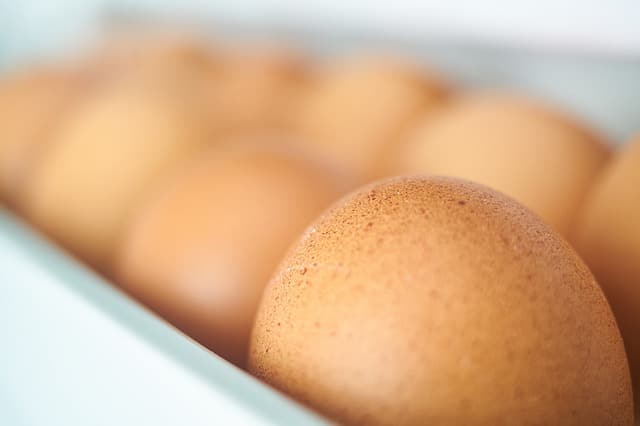
Many people assume that chickens are better egg producers than ducks simply because we are so accustomed to seeing chicken eggs lining the grocery store shelves.
However, ducks are equally good layers and, in some cases, even better.
If you live in a climate that is better-suited to ducks, such as the northwestern portions of the United States, you are actually going to find that ducks are better adapted to the climate.
As a result, the best-laying duck breeds outperform the best-laying chicken breeds each and every time.
Why?
Ducks have the unique ability to free-range on foods that chickens can’t.
They will eat a variety of foods like slugs and snails and also perform better in rainy, wet conditions.
As a result, their laying ability will remain consistent in these climates while you may find that a chicken’s tapers off.
In addition, people who are allergic to chicken eggs can often eat duck eggs.
While there are some people who are allergic to both, this is quite rare, and you won’t usually find a person who is allergic to duck eggs but not to chicken eggs.
Laying Cycles
Ducks tend to be productive while laying eggs for much longer than chickens.
In fact, ducks from some of the top egg-laying breeds lay for years, outperforming chickens by far.
Chickens, on the other hand, usually taper off after year two or three.
Ducks lay eggs that are much larger than chicken eggs.
Many people assume that duck and chicken size will correspond with egg size, but interestingly, some dual-purpose duck breeds (like Anacondas) lay eggs that are much larger than you would expect for the duck’s size.
Ducks have a tendency to produce eggs that are larger than those produced by chickens of a similar size.
Ducks usually lay their eggs between 4 am and 8 am every day. Their eggs are usually laid in the pens where they are kept at night.
This can be quite convenient for people who raise ducks – because eggs are laid before they even are let out of the pen, you probably aren’t going to have to go looking for a nest of eggs.
You can collect eggs just once a day when you let the ducks out.
Chickens, on the other hand, have a 26-hour laying cycle. Each day, your hens’ laying times might be unpredictable.
While chickens won’t usually lay later in the day, you may have an unbalanced egg basket if you collect at the same time every day!
That being said, chickens are superior to ducks in the fact that they almost always return to the nest boxes to lay.
Once they’ve been trained to a specific area, they are very predictable and you usually won’t find their eggs hidden all over your property.
Chickens also need more daylight hours to lay. When you have fewer daylight hours during the winter months, you may have to supplement your light or see a decline in egg production.
Chickens also eat more in the winter since they can’t eat bugs and grass. This is not the case with ducks.
Both chickens and ducks molt.
Chickens usually molt during the fall and need to be fed more protein during this time. Egg production can slow or even stop.
Ducks molt in a different fashion.
These creatures have “nesting molts” during which downy feathers are removed from their bodies to feather their nests.
These feathers are regrown at some point over the next few weeks.
Like chickens, ducks molt in the fall and late summer. Females spend less time molting than males and also lose fewer feathers.
Most Productive Egg Laying Duck Breeds
The laying ability of your flock will depend largely on the breeds you select. Some duck breeds are better at laying eggs than others.
Here are some to consider that will give your chickens a run for their money.
- Anacona: 210-280 white, blue, cream, or green-colored eggs each year
- Buffs: 150-220 large white to cream-colored eggs each year
- Campbell: 250-340 white to cream-colored eggs each year
- Cayuga: 100-150 charcoal-colored eggs each year
- Magpie: 240-290 white, cream, blue, or green colored eggs each year
- Muscovy: 180-200 extra-large eggs each year
- Pekin: 200 large/extra-large white eggs each year
- Runner: more than 300 white and blue-green eggs each year
- Saxony: 190-240 white and blue-green eggs each year
- Silver Appleyard: 220-265 extra-large white eggs each year
- Welsh Harlequin: 240 to 330 cream-colored eggs each year
Most Productive Egg Laying Chicken Breeds
Just as people value certain breeds of ducks for their egg-laying abilities, so are certain breeds of chickens prized.
Here are some of the best egg-laying chicken breeds.
- Golden Laced Wyandotte: 200 large brown eggs each year
- Isa Brown: 300 large brown eggs each year
- Rhode Island Red: 150-200 medium brown eggs each year
- New Hampshire Red: 299 large brown eggs each year
- Red Star: 300 medium-large eggs per year
- Marans: 150-200 chocolate-colored eggs per year
- Ancona: 180-220 white eggs per year
- White Leghorns: 280-320 medium white eggs per year
- Golden Comet: 250-300 large brown eggs each year
- Barnevelder: 180-200 chocolate brown eggs per year
- Ameraucana: 250-260 eggs of various colors each year
- Buff Orpington: 150-200 eggs per year
- Australorp: 250-364 eggs per year
- Speckled Sussex: 200-300 eggs per year
- Hamburg: 200-210 medium white eggs each year
- Barred Plymouth Rock: 200-280 light brown eggs each year
- Welsummer: 150-160 dark brown eggs per year
Meat Production
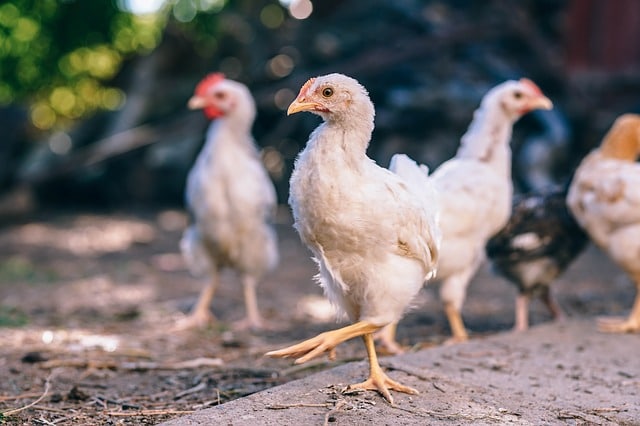
Chickens and ducks can both be raised for meat.
Duck meat is mostly dark meat, while chicken meat will contain a mixture of white and dark cuts.
Both chicken and duck meat can be equally healthy for you – ducks that are raised in a natural environment will have meat and eggs with higher contents of omega-3 essential fatty acids and other nutrients, just as chickens do.
Raising chickens and ducks for meat is an identical process – as is butchering and processing.
Ducks can be a bit more difficult to pluck as they have denser feathering and down.
Best Duck Breeds for Meat Production
Thinking about raising ducks for meat? Here are some of the top breeds to consider, along with their ideal processing weight.
- Pekin: grows up to 7 lbs
- Jumbo Pekin: grows up to 11 pounds
- Rouen: grows up to 9 lbs
- Muscovy: grows up to 14 lbs
- Saxony: grows up to 10 lbs
Best Chicken Breeds for Meat Production
As with ducks, choosing the best chickens bred for meat production can make a major difference on your homestead. Here are some to consider:
- Cornish Cross: grows up to 12 lbs
- Jersey Giant: grows up to 13 lbs
- Bresse: grows up to 7 lbs
- Orpington: grows up to 10 lbs
- Buckeye: grows up to 9 lbs
Housing
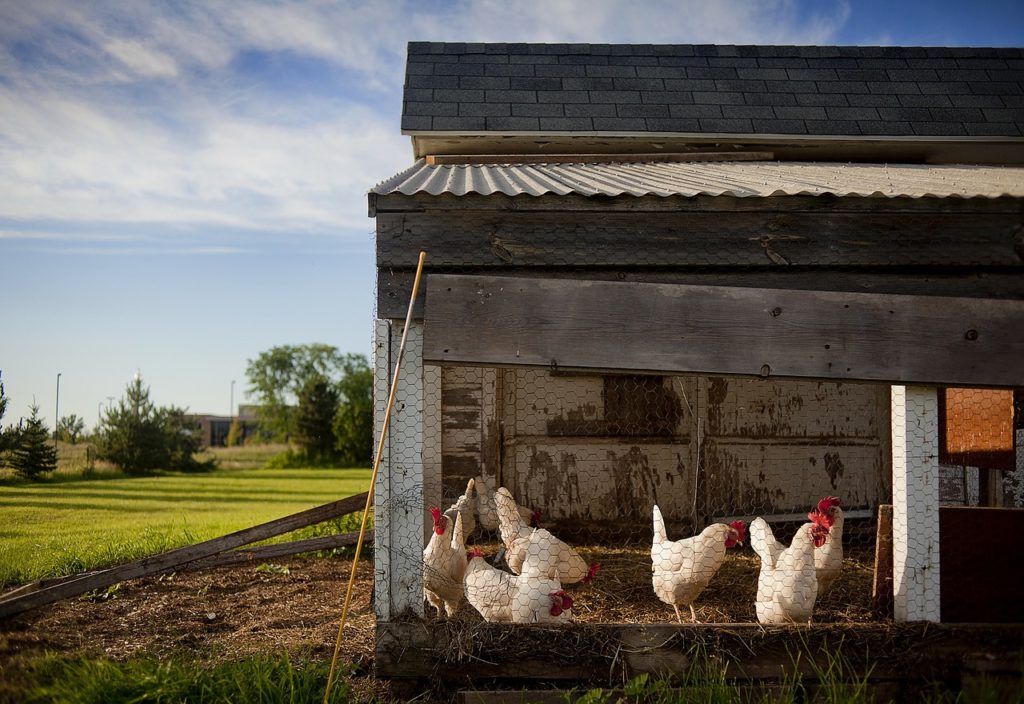
Ducks are easier to control in some regards than chickens.
They can be confined with a fence that’s only about two feet high as long as they have water, food, and other ducks with them. They simply don’t have the ability to fly as high as chickens can.
Keep in mind that egg-producing chickens are usually going to be a bit more flighty than meat chickens, too, since they will be lighter in weight – you are going to need a tall fence or a completely covered run to keep them out of the garden and inside the pen.
In some cases, you may even need to clip their wings.
Unfortunately, ducks are more susceptible to predators than chickens.
They don’t run as quickly and since they move in a group, they will have a harder time getting away from potential intruders.
Ducks don’t do as well when raised in confinement conditions.
Because ducks drink more water than chickens, they have looser, liquidy poop. They need more space as a result.
When thinking about sleeping arrangements, ducks are the easier species to accommodate.
Chickens roost on raised perches at night, meaning you will need to build roost bars for them to use.
Ducks are happy to sleep on the floor, and so while they require more floor space than chickens, you won’t need to build extra structures in your coop.
Training Ability and Demeanor
Training ability and personality will depend largely on the breed and on individuals within your flock.
The best way to ensure that both your ducks and chickens are friendly is to make sure you start them young.
Ducks tend to be slightly friendlier, but most chickens are pretty easygoing, too.
Ducks tend to be less aggressive toward other members of the flock.
They won’t engage in the violent pecking behaviors that chickens do, and if a duck does happen to peck you, it’s not going to hurt as much as a chicken peck because its beak is rounded.
Also, domestic ducks don’t fly, which can make them easier to handle.
Ideal Climate
Both chickens and ducks can be raised in a variety of climates.
Ducks are more likely to free range in cold, wet conditions – their feathers are better at shedding the rain and keeping them warm.
While some chicken breeds are adapted to cold or rainy climates, their feathers don’t do as good of a job as keeping them protected from the elements.
If you live in a cold, wet area, you will want to avoid feather-footed breeds like Silkie chickens altogether.
Ducks tend to be relatively consistent with their laying throughout the year.
While production may occasionally drop off, you aren’t going to see the steep declines related to daylight hours like you will with chickens.
Diet
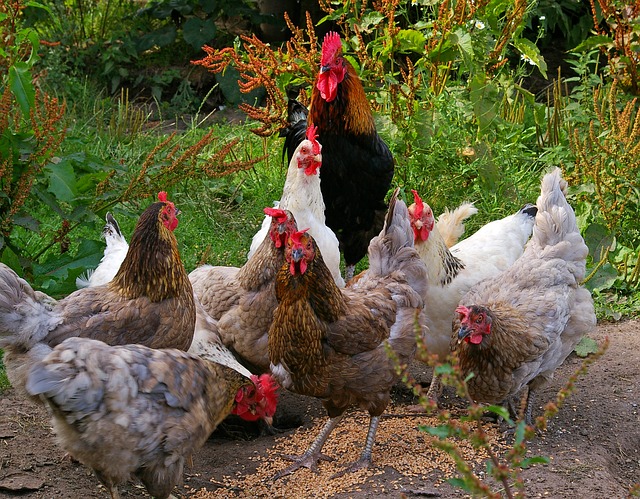
Chickens and ducks are able to forage, and if you allow them free access to pasture, they can comprise a majority of their diet with these food sources.
Both species eat grains, bugs, and greenery, but ducks prefer to eat more greenery than chickens.
Ducks can also forage in lakes, ponds, wetlands, and other waterways, too, while chickens are restricted to the mainland.
Both chickens and ducks will do quite well when allowed to free-range.
Of course, there is some natural variation among breeds here, but for the most part, both species of poultry will enjoy wandering around the yard looking for snacks.
Chickens will eat just about any kind of pest, but they aren’t as fond of snails or slugs – ducks, on the other hand, love these.
Ducks are also not as likely to tear up plants and to spread dirt all over the place.
Water – Lots of It
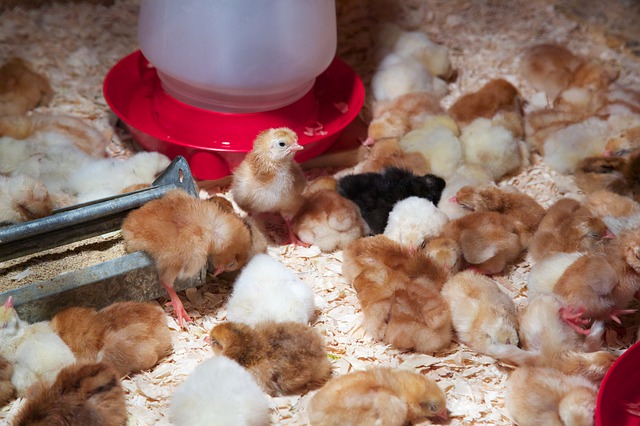
Water is the main area where chickens are the clear winner for the homestead.
Ducks need water – and lots of it. While chickens need drinking water, they aren’t going to need nearly as much water as ducks are.
Ducks need water to bathe in, keeping their feathers and skin in good condition by bathing in water and then preening and coating their feathers with wax.
This is why ducks do so well in cold, wet weather – they have a waterproofing layer on their feathers just like you might put on your boots.
Unfortunately, this waterproofing ability makes it extremely difficult to raise ducks in confinement.
Ducks cannot be raised without bathing water.
You will need to provide them with either a small pond or a kiddie pool of water.
This needs to be provided year-round, so if you live in an area where you experience heavy freezes throughout most of the winter, ducks might not be the best option for you. In addition, it’s not enough to make a duck pond and then leave it.
No, you are also going to need to clean and change that pond water from time to time to keep it sanitary and prevent disease.
Chickens, on the other hand, groom themselves by dust bathing.
These are much easier to make and can be maintained throughout the winter months.
Chickens will often make their own dust baths by digging up a section of the run and allowing it to become dusty and dry.
When it comes to drinking water, ducks need a lot more, too. Each chicken needs half a liter of water per day, while ducks need a full liter each.
Ducks tend to make a mess of their watering system – they like to play in it – while chickens are more refined.
You will need different types of waterers, too, because both species of poultry have different shaped mouths and will slurp up water in different manners.
Health
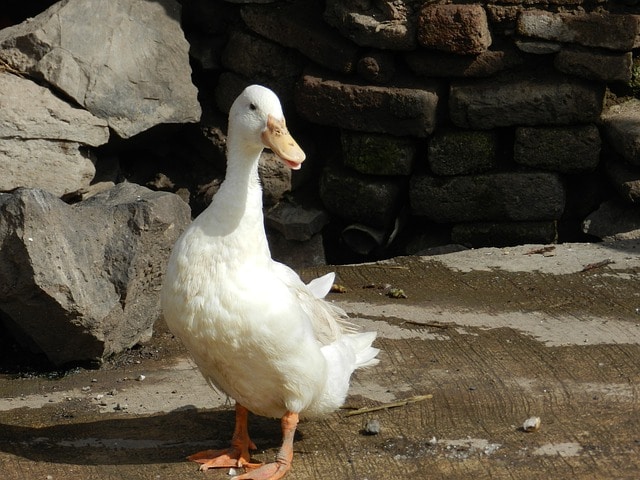
Ducks tend to be more resistant to disease than chickens, particularly at a younger age.
Ducklings tend to be harder than chicks because they are heavily feathered from the start and also have a dense layer of subcutaneous fat.
Designed for cold, wet weather, ducklings can be removed from the brooder and placed outside earlier than chicks.
They can be out foraging by the third week of life, while chickens need to be kept in the brooder for a minimum of six weeks – longer if it’s very cold out.
Portability
Ducks are easy to herd.
They tend to travel in groups, so it’s easy for you to walk behind them as a group to guide them into the areas you need them to go.
Because of this, in many areas, commercially-raised ducks are kept in pens that are separate from their foraging areas and they are then herded to each location every day.
Unfortunately, you cannot do this with chickens.
Chickens cannot be herded (although we’d love to see the chicken keeper who is able to do this!) and so the coop needs to be adjacent to foraging areas.
In order to move the forage area, you must move the house.
Many people raise their chickens in chicken tractors, which are portable houses with no floors that are moved on to fresh pasture each and every day.
These housing systems are an excellent option for people who are raising lots of chickens yet want to make sure they are always on fresh grass.
Chicken tractors, however, do not work well with ducks.
Because ducks do not roost at night, they need extra space in the tractor to sleep.
They also need more water and bigger containers for their water, which can be a pain to move every night.
Plus, by the time you provide all the amenities that your ducks need, your chicken tractor could very well be far too big to move.
Noise
Ducks aren’t quite as noisy as chickens.
Although their quacks can often be heard from an impressive distance away, your neighbors are less likely to be offended by an occasional quack than by the crowing of a rooster every morning.
Ducks make more consistent noises, quacking when they are in their pools, when it’s time to eat, or even when the wind is blowing – but they usually aren’t that disruptive when compared to the clocklike crowing regimen of the rooster.
That being said, compare females of both species, and you likely won’t find a major difference in noisiness.
The biggest issue related to noise that you may find is that hens like to make their “egg-laying songs” or cluck when they are irritated. Otherwise, they are mostly quiet.
Availability in Stores
Head over to your local farm supply store. Which do you see more of – chickens or ducks?
Most likely, your answer is going to be chickens.
The reality is that chickens are usually less expensive and more readily available in stores than ducks are.
While both can be ordered from hatcheries and shipped directly to your house, if you want a quick purchase, chickens are the way to go.
Day-old chicks are also often sold sexed, meaning you can get as many of each gender as you would like.
Laying duck breeds are usually sold as straight-run. In other words, you get what you get.
Now, if you decide to sell your eggs, you are going to face another challenge. Chicken eggs are by far the most marketable type of eggs.
If you live in the United States or Europe, selling duck eggs is going to be an uphill battle for you.
While it’s not impossible – there are plenty of people who understand just how delicious and healthy duck eggs are – you may have to do some marketing and customer education on how to cook them.
Can You Raise Ducks and Chickens Together?
If you’re reading this article, you might still be scratching your head, saying, “Hm. Both chickens and ducks have their pros and cons – can I just raise both species?”
The short answer is yes!
You can raise both chickens and ducks.
However, the answer to this question becomes a bit murkier when you are trying to decide whether they can be raised in the same living area.
Generally speaking, keeping chickens and ducks together can be a challenge if you aren’t aware of the two very distinct housing requirements of both.
It’s not recommended that you keep ducks and chickens in the same sleeping quarters.
Ducks need a lot of water, and will add a lot of moisture and humidity to the air with their playful, water-loving behavior.
Chickens can’t be kept in such wet conditions, so you will need to add extra ventilation to the coop.
If you are trying to keep the two species together during the winter, exercise extreme caution – if you don’t have the appropriate set-up in your coop, you may see some serious health problems in your chickens as a result.
Otherwise, chickens and ducks are both relatively easy to raise, with clear pros and cons for each species.
Consider which one will work best with your climate, homestead set up, and lifestyle, and start researching the best breeds for your needs today!
